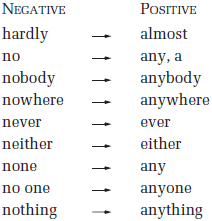Double Negatives
We use only one negative to express a negative idea. In the English language, two negatives in the same clause "cancel each other out," and the idea becomes positive again. Therefore, it is incorrect to use two negatives with one verb. We call this a double negative, and we avoid it.
|
NO: NO: NO: NO: NO: NO: NO: NO: |
Liz never needs no help. Bob hasn't no comb. Scarcely none are left. Todd never needs no supervision. Mr. Babikian hasn't no beard. (two negatives) A witness doesn't need no lawyer. (two negatives) That person hasn't no conviction. (two negatives) Moe doesn't want no advice. (two negatives) |
Examples 1
Choose the correct word to complete each sentence. Avoid double negatives.
- We (could, couldn't) hardly hear the speaker.
- Minh doesn't want (no, any) pie.
- Your brother isn't (nothing, anything) like mine.
- Scarcely (nobody, anybody) could hear the speaker.
- The asthmatic people (could, couldn't) hardly breathe in the smog.
- Tobias doesn't bring (nothing, anything) to school.
- My new car doesn't need (no, any) gas.
- Alexander Martin (would, wouldn't) hardly acknowledge the value of the Constitution.
- He didn't have (nothing, anything) good to say about it.
- The orators weren't using (any, no) microphones.
Solutions
- "Couldn't" and "hardly" are both negatives, so we choose "could." We could hardly hear the speaker.
- "Doesn't" and "no" are both negatives. (To not want no pie is to want some pie!) Minh doesn't want any pie.
- "Isn't" and "nothing" are both negatives. Your brother isn't anything like mine.
- "Scarcely" and "nobody" are both negatives. Scarcely anybody could hear the speaker.
- "Couldn't" and "hardly" are both negatives, so we choose "could." The asthmatic people could hardly breathe in the smog.
- Tobias doesn't bring anything to school. The words "doesn't" and "nothing" are both negatives. We use "anything" instead of "nothing."
- My new car doesn't need any gas. The words "doesn't" and "no" are both negatives. We use "any" instead of "no."
- Alexander Martin would hardly acknowledge the value of the Constitution. The words "wouldn't" and "hardly" are both negatives. We may use only one negative to express an idea, so we choose "would."
- He didn't have anything good to say about it. The words "didn't" and "nothing" are both negatives. We choose "anything."
- The orators weren't using any microphones. The words "weren't" and "no" are both negatives. We use "any" instead of "no."
Correcting Double Negatives
To correct a double negative, we can replace one of the negatives with a positive word. Look at the positive forms of the negatives below:

Examples 2
Rewrite this sentence, correcting the double negative:
Neither of them saw nobody.
Solutions
We replace the second negative, nobody, with a positive form—anybody:
Neither of them saw anybody.
Remember that a sentence can contain more than one negative, as long as they are not in the same clause. The sentence below is correct because each negative is in a different clause.
I didn't go to the store, so I have no milk.
Rare Exceptions
On rare occasions, two negatives can be used for effect. Consider the following sentences:
The game was so easy, I couldn't not win!
Kim barely, barely made it on time.
In sentences such as these, the double negative is deliberate. Most double negatives, however, are unintended and incorrect. They are often heard in speech, but that is no excuse for using them.